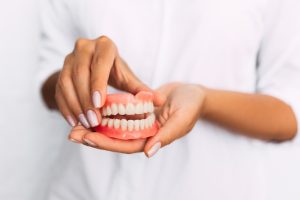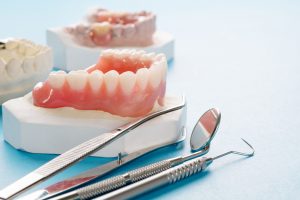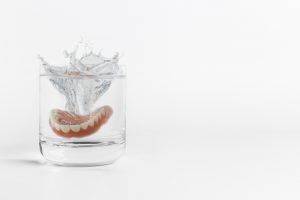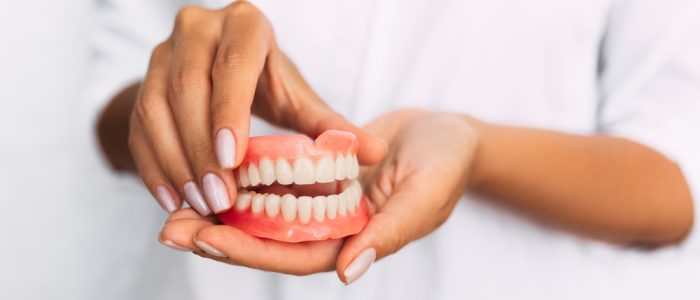Dentures FAQs

Northside Dental Clinic is a top dentist office in Springfield, Missouri. Our doctors have decades of experience, and we’re here to help you with your dental needs.
We answer frequently asked questions about dentures in today’s blog.
Why do people need dentures?
Dentists provide dentures to patients who are missing teeth because of tooth decay, injury, and gum disease so that people can improve their smile and their health. These dental appliances make it easier to speak and eat than it would be without them because of your missing teeth.
Do they make dentures look like real teeth?
Yes, manufacturers create them to look as close to natural, real teeth as possible.
When should I take out my dentures?
Your soft tissues (gums) may become irritated if you wear dentures 24-hours-a-day. Dentists recommend taking them out when you go to bed at night.
How much does a good set of dentures cost?
At Northside Dental Clinic, we offer a full set of permanent dentures for $2,094.
You receive:
- A wax try-in to ensure satisfaction and proper function
- Acrylic appliances made with strong materials
- Five-year warranty against breakage due to normal wear and tear
- Three free adjustments
- Five percent discount for seniors aged 60 and older.

What are dentures made of?
They are made of acrylic resin or porcelain.
Acrylic resin, a type of plastic, is generally what dentists prefer because this material is stronger, and dentists can more easily adjust acrylic dentures. Acrylic more easily bonds to the base, and it’s lighter in weight and less expensive compared to porcelain.
The downside is that acrylic varieties wear faster than porcelain.
How often do I need to replace my dentures?
You may need another set of acrylic appliances every five to eight years due to normal wear and tear.
What types of dentures are there?
- Just like it sounds, partials are designed to stand in for some, not all, of your natural teeth.
- Full sets replace all of your teeth on your upper or lower jaw or both.
- Conventional types are fully removable, and they go in your mouth after your gum tissues have healed following the extraction of your natural teeth.
- Immediate types serve as temporary stand-ins for your natural teeth while you wait for your permanent set.
- Overdentures fit over a small number of remaining teeth, although dental implants serve the same function.

What happens during denture appointments?
Your appointments occur in several steps.
The first appointment consists of your dentist assessing what is best for your situation. About a month later, a dentist will extract your teeth to make room for a full set.
Second, your dentist will extract all of your remaining teeth along one jaw or both, and you will receive a set of immediate dentures until your permanent set comes in.
After giving your gums time to heal, about six to eight weeks, your dentist will take wax impressions of your upper and lower jaw to ensure a proper fit. You might spend around 30 minutes at this appointment, and your dentist will make sure your gums have healed correctly before taking the wax impressions.
Third, you get to try a set of wax dentures, so the laboratory knows exactly where to fit the teeth. Your dentist will fit these wax models in your mouth and make a record of bite impressions, so the lab knows where to place the teeth in the permanent set made of acrylic. This is called a try-in ahead of getting your permanent set, and it should last around an hour.
Lastly, you receive your final set of dentures a few weeks after the try-in. This appointment lasts up to an hour.
Anywhere from one to three days after receiving your permanent set, you receive your first adjustment. This is to make sure your set of new teeth are comfortable and they work well. If your dentures ever feel uncomfortable, feel free to make an appointment with your dentist.
Are immediate dentures painful?
Your dentist will use a local anesthetic like Novacaine to numb the extraction site. The numbness will last for several hours, including during the time your immediate dentures are placed in your mouth. Your gums may feel sensitive for a few days following the extraction and because of your new teeth.
Do immediate dentures look natural?
Modern manufacturers can make immediate dentures look as natural as possible so that people can’t distinguish them from natural, normal teeth. Your dentist will talk to you about your options for the right colors to match what your natural teeth look like.
What is relining of dentures?
When we reline your appliance, our staff reshapes the underside of your set so that it fits more comfortably against your gums. Our dental staff might reline your dentures periodically because they might start to lose grip on your mouth. This process doesn’t take very long, usually less than 30 minutes.

Do dentures get stains?
Yes, just like your natural teeth, these false teeth may get stains or discoloration from drinks such as wine, soda, tea or coffee. You may also get stains from foods like curry, tomato sauce, berries and hard candy.
How do I clean my dentures?
The American Dental Association recommends the following steps for cleaning dentures:
- Rinse them before brushing. There are several rinsing and soaking products you can buy over the counter. Perform this daily.
- After rinsing, brush your appliance with a soft bristle toothbrush with a non-abrasive cleanser to prevent scratching. Do this daily.
- While your appliances are out, clean all parts of your mouth, from the gums and cheeks to the roof and tongue, with a toothbrush and toothpaste to remove any plaque to help reduce the risk of bad breath and irritation.
- Put them in a safe place covered in water to prevent warping. Consider using a glass of water or a specialized case to store your dentures.
What is the average age for getting dentures?
Although there is no average age for getting this type of dental appliance, most people who have them are over the age of 45.
How often do dentists adjust dentures?
As your mouth changes, your dentist might adjust dentures several times over the years you have them. You may see more than three adjustments in the five to eight years they last.
How many dental offices offer dentures in Springfield, Missouri?
Dozens of dental offices, and more than 100 dentists offer dentures in our fine city. Have any more questions? Reach out to Northside Dental Clinic or call (417) 862-2468.

